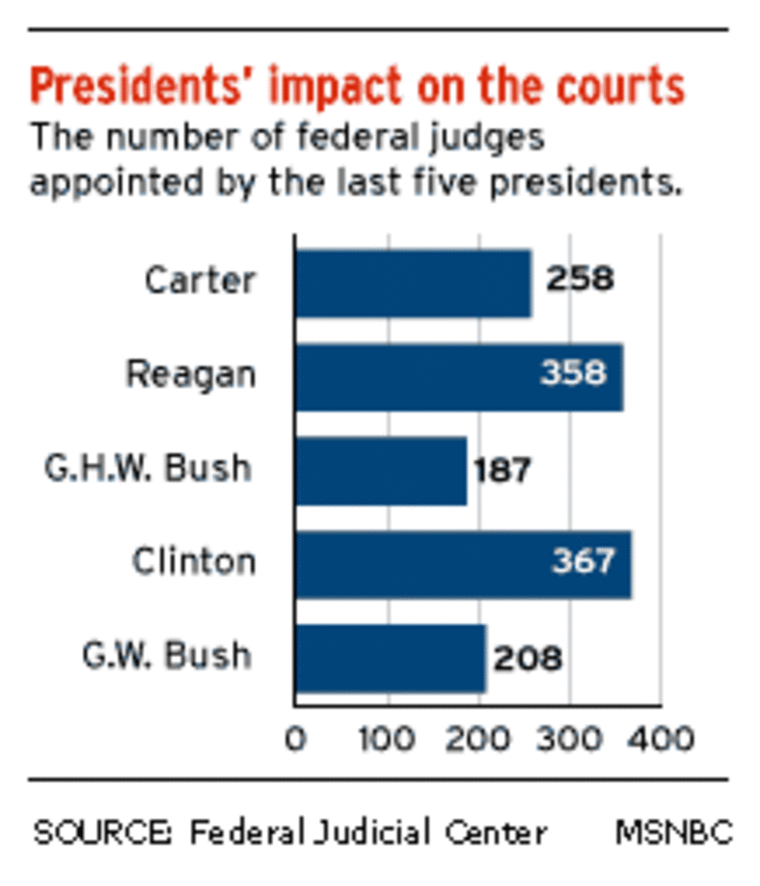Senate Majority Leader Bill Frist proposed a change in Senate procedures Thursday that would guarantee an up-or-down vote for each of President Bush’s nominees to the federal courts, but Minority Leader Harry Reid quickly rebuffed the idea, setting the stage for a vote next month on ending filibusters of judicial nominees.
“I don’t mean to demean the proposal,” said Reid on the Senate floor immediately after Frist announced it. But he mocked it as “a big wet kiss to the far Right.”
If Frist can’t persuade Democrats to agree to up-or-down votes on Bush’s judicial nominees, he’ll seek a rules change that would lower the number of votes needed to cut off debate on nominees from 60 to 51.
Democrats are reluctant to give up the filibuster in a year in which there may well be a Supreme Court vacancy.
Frist’s offer to Senate Democrats Thursday included 100 hours of debate on every nomination.
Weeks ago Reid rejected the idea of accepting 100 or 200 hours of floor debate on each judicial nominee.
Frist also called for new procedures to ensure that no nominee would be bottled up in the Senate Judiciary Committee.
Possible Bolton filibuster?
Reid implied Thursday that Democrats might use extended Senate debate to delay or block a vote on Bush’s nominee as ambassador to the United Nations, John Bolton.
“That may be something that people will wish to talk a long time on,” he mused.
In 2003 and 2004 Democrats used filibuster threats to block votes on 10 Bush appeals court nominees; they have allowed 34 to be confirmed. They have also allowed 171 Bush district court nominees to be confirmed.

The Republicans made unsuccessful attempts to cut off debate on the 10 blocked nominees and bring them to confirmation votes. They failed to garner the 60 votes needed under Senate rules to end filibusters.
Reid portrayed those votes as de facto vote on the nominations. Those nominees “had a vote in keeping with the rules of the United States Senate,” Reid contended.
In his comments Reid seemed to hint that Democrats would not necessarily use the filibuster against Bush’s nominees.
“Test us,” he said, “let’s see how we can do in the future. I can’t say there won’t be any filibusters, but I think we’re going to have a much better situation” than in 2003 and 2004.
Senators, he argued, should not change Senate rules “for fear of something that may never happen.”
Wait until 2007
He conceded that Democrats are unlikely to regain control of the Senate in next year’s elections, saying it would take “a little miracle” for the Democrats to score the net gain of six seats they would need.
Therefore, he implied, the GOP leaders could afford to wait until 2007 to make their rules change.

But it seems extremely unlikely that Republicans would be willing to defer the issue until 2007. One of Bush’s appeals court nominees, Priscilla Owen of Texas, has waited four years for a floor vote on her nomination.
“Soon now, all 100 members will need to decide whether or not to restore the precedent of an up-or-down vote or let what has happened in the last two years stand for the foreseeable future,” a Frist aide told reporters Thursday.
Early this week Reid offered an accord in which Republicans would give up on a few, perhaps three, of Bush’s judicial nominees in return for Democrats ceasing their filibusters of nominees.
The Frist aide said GOP senators “were fairly confused about what Sen. Reid might have been offering: is it two out of seven or three of seven (of last year’s blocked nominees)? Who is supposed to be selected for success? Who is supposed to be consigned to failure?”
One remote possibility remained for breaking the deadlock: that Republicans would simply shelve a few of the nominations that Democrats find most objectionable, such as that of Janice Rogers Brown, without asking Bush to withdraw them outright.
Reminded that Frist said Tuesday that he would not ask Bush to withdraw any of the nominees, the Frist aide replied, “This is an internal Senate matter.”
Weighing public opinion
The third-ranking Senate Republican, Sen. Rick Santorum of Pennsylvania, told reporters late Thursday that he’s confident that the American public clearly sees the judicial nominees issue as GOP senators do: a matter of majority rule.
“I don’t think it is complicated at all,” he said. “What’s happening here is that minority is going to exercise the right of confirmation and that means elections really don’t mean what they used to mean. What they used to mean was the majority would exercise certain rights within the Senate.”
When one reporter asked Santorum what would be the consequences if Frist put his filibuster rules change to a Senate vote and lost that vote, he said, “It would be a great disappointment to me. We’d have a lot fewer judges being confirmed this year and I really hesitate to think what would happen with a Supreme Court justice. I think it could be an awful situation.”